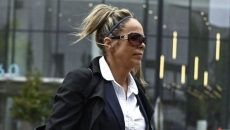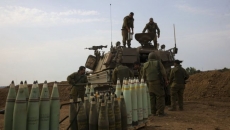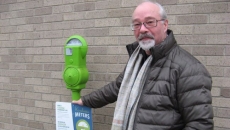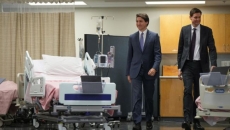Former foreign affairs minister Marc Garneau says Canada has lost its standing in the world under the tenure of Prime Minister Justin Trudeau, whom he criticizes as an ill-prepared leader who prioritizes politics and makes big pronouncements without any follow-through.
"I believe Justin Trudeau has overestimated Canada's impact abroad," Garneau writes in his autobiography, "A Most Extraordinary Ride: Space, Politics and the Pursuit of a Canadian Dream," which is scheduled to be released in October by Signal, an imprint of Penguin Random House.
While much of the book is a trip down memory lane for Garneau's pre-politics career in the military and as an astronaut, the final third is devoted to his time as a member of Parliament.
Garneau, now 75, was first elected in 2008 as the Liberal MP for the Montreal riding of Westmount-Ville Marie, a riding that later became Notre-Dame-de-Grâce-Westmount after boundary changes in 2015.
He staged an unsuccessful run for the party leadership in 2013, ultimately withdrawing from the race and backing Trudeau, who would go on to win in a landslide victory.
After the Liberals came to power in 2015, Garneau served in Trudeau's cabinet for six years, more than five of those as the minister of transport. He spent the final nine months as the minister of foreign affairs, until Trudeau dropped him from cabinet completely after the 2021 election.
In his book, Garneau acknowledges being "blindsided" by that decision — one he says Trudeau never explained.
He writes that Trudeau did offer him the ambassadorship to France during a phone call about the decision, but Garneau said no. He said he would prefer to be an ambassador in Washington, D.C. Trudeau thought about that and ultimately said no.
Garneau makes it clear that he and Trudeau had little in common outside of their "Liberal values," and that the two were not close.
Another thing he makes clear: Garneau thinks Trudeau did not value the importance of a foreign affairs minister, and isn't very good at international relations.
"Unfortunately Canada's standing in the world has slipped, in part because our pronouncements are not always matched by a capacity to act or by actions that clearly demonstrate that we mean what we say," Garneau writes. "We are losing credibility."
He describes Trudeau's trips to China in 2016 and 2017, and to India in 2018, before his tenure as foreign minister, as "not successful."
The two China trips failed to kick-start free-trade talks with China, and Trudeau was criticized at the time for trying to bring non-trade issues to the table in talks with the Chinese government. That included pushing on human rights, which did not go over well in Beijing.
The India trip's failures were well-documented, including the embarrassment of inadvertently offering a reception invitation to a man convicted of trying to assassinate an Indian cabinet minister in Canada in 1986.
"We were not properly prepared," Garneau said of the three foreign visits.
"At a fundamental level, we did not understand who we were meeting. We thought we could seduce and were surprised it didn't turn out that way. Gone was the clear-eyed approach of a prime minister like Jean Chrétien, who always knew with whom he was dealing and who forged pragmatic alliances with world powers."
Garneau also criticizes Trudeau for delaying the release of new national strategies for dealing with China and expanding Canada's relationship in the Indo-Pacific region.
The China strategy was delayed largely because Trudeau and his "entourage" were hesitant to release anything on it while Michael Kovrig and Michael Spavor were still detained in China, he writes.
"I think that was a mistake, pure and simple."
Likewise, he says he could not get a new Indo-Pacific strategy in front of cabinet, and it wasn't actually released until November 2022 — a year after it was ready, and a year after Garneau had been moved out of the portfolio.
Garneau declined a request for an interview about the book.
Trudeau's office has not responded to a request for comment on its contents.
The ex-astronaut is not the first former Trudeau cabinet minister to pen a memoir that lambastes the prime minister. In 2023, former finance minister Bill Morneau released his own memoir, which criticized Trudeau for making mostly unilateral decisions and putting politics ahead of policy.
Both of them describe a concentration of power in the Prime Minister's Office that did not improve despite Trudeau's promises to decentralize when he came into office in 2015.
Garneau writes that when he was in charge of transport, Trudeau didn't seem to have much interest in the file at all. When he moved to foreign affairs, he hoped the prime minister would be more interested in seeking out his input on issues.
But, Garneau says, he did not.
He writes that Trudeau only called upon him once to offer advice, at a meeting with then-ambassador to China Dominic Barton, in a discussion about the ongoing plight of the two Michaels.
"The prime minister's aloofness led me to conclude that he did not consider my advice useful enough to want to hear from me directly, relying instead on his staff," Garneau recounts.
"I found this disappointing to say the least. The expectation was that communication between him and me would be via the (Prime Minister's Office), and so consequently I never knew what information, if any, reached him."
The Trudeau government, Garneau contends, is overall too reactive and ill-prepared.
"It is not sufficient to pay attention only when a concern arises, something this government has made a habit of," he writes.
Garneau says he found that the fact Canada had gone through so many different foreign affairs ministers undermined its credibility in the role and left an impression that Trudeau and Canada don't value or prioritize the file.
Garneau was the fourth of five people who have headed up Canadian foreign policy over the 8 1/2 years Trudeau has been prime minister.
"Our allies could logically question whether Canada attached sufficient importance to this portfolio, and they did," Garneau writes.
During every one of his introductory calls with counterparts, he says he was told they hoped he'd last longer than his predecessors, something he describes as "a not so subtle message."
It didn't happen.
Garneau lasted just nine months, the shortest of any of the five.
Chrystia Freeland, the second to be named to the role, held the role for almost three years, and Mélanie Joly, the current foreign affairs minister, is closing in on 33 months in the role.
Stéphane Dion was the first, holding the title for 18 months, and François-Philippe Champagne, who was the third minister of foreign affairs, was in place for 14 months.






